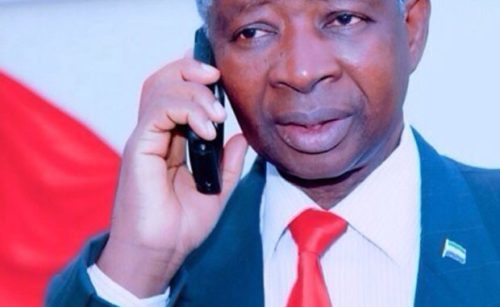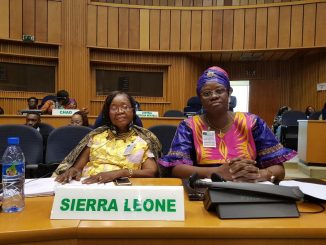
POSITION PAPER BY THE APC ON THE APPOINTMENT OF MR MOHAMED
KENEWUI KONNEH AS CHAIRMAN AND CHIEF ELECTORAL COMMISSIONER OF THE NATIONAL ELECTORAL COMMISSION (NEC).
The appointment of Mohamed Kenewui Konneh by His Excellency Rtd, Brigadier Julius Maada Bio was made pursuant to Section 32(3) of the Constitution of Sierra Leone Act No. 6 of 1991 (the Constitution), and by virtue of a Press Release dated 20th July, 2020 issued by the Office of the President.
The facts leading to the referred appointment of Mr. Mohamed Konneh are stated in the APC Press Release dated 20th July, 2020 in which the party registers its objection to the appointment. These facts would therefore not be re-stated here. We are of the opinion that APC’s objection should be premised on three grounds. First, Mr. Konneh, as Director of the Financial Intelligence Unit (FIU), is a public officer within the meaning of the Constitution, making him ineligible to be appointed Chairman of NEC.
Second, Mr. Konneh, as Director of the FIU, was an employee of a public corporation up to the time of his appointment as Chairman of NEC, making him disqualified from being so appointed. Third, President Bio’s appointment of Mr. Konneh goes against the intention of the drafters and spirit of the Constitution and the Public Elections Act No. 4 of 2012 (PEA 2012).
I l P a g e
MR. KONNEH DISQUALIFIED AS PUBLIC OFFICER
Section 32(4) (a) and (b) of the Constitution sets out the qualification for appointment as Chairman of the NEC and the class of persons who are disqualified from being so appointed. These provisions are produced below:-
32(4) A person is not qualified-
(a) for appointment as a member of the Electoral Commission if he is not qualified to be elected as a Member of Parliament, or
(b) to hold office as a member of the Electoral Commission if he is Minister, Deputy Minister, a Member of Parliament, or a public officer, or if has attained the age of sixty-five years. ”
The above-quoted section 32(4) (a) makes express reference to qualifications and disqualifications for election of Member of Parliament as necessary prerequisites for appointment of any person as a member of the NEC. By so doing, it is our opinion that Sections 75 and 76 of the Constitution, which deal with qualifications and disqualifications for election of Member of Parliament, are equally applicable to the appointment of a member of NEC. In a similar vein, sections 41 (d) and 56(2)(a) regarding the qualifications for election of president and appointment of minister, respectively, make reference to and incorporate sections 75 and 76 of the Constitution. Of particular relevance to this opinion is section 76(1) (b) of the Constitution which is produced below:
“76(1) No person shall be qualified for election as a Member of Parliament-
(b) if he is a member of any Commission established under this Constitution, a member of the Armed Forces of the Republic, or a public officer, or an employee of a Public Corporation established by an Act of Parliament, or has been such a member, officer or employee within twelve months prior to the date on which he seeks to be elected to Parliament
2 1
Our reading of sections 32(4) (b) together with 76(1) (b) of the Constitution, clearly indicates that a public officer is ineligible for appointment as a member of NEC. Section 171 (1) defines not only the term public officer, but also public service and public office. These definitions are stated below:
“Public officer” means a person holding or acting in a public office”
“Public office” includes an office the emoluments attaching to which are paid directly from the Consolidated Fund or directly out of moneys provided by Parliament”
“Public service” mean subject to the provisions of subsections (3) and
(4), service of the Government of Sierra Leone in a civil capacity and includes such service in respect of the Government existing in Sierra Leone prior to the twenty-seventh day of April, 1961.”
In the unreported cases of SC 1/2007 and SC 2/2007 between: Charles
Francis Margai & Another and Solomon Berewa and The Chief Electoral Commissioner (the Berewa case), the Supreme Court upon construction and interpretation of the above definitions, had this to say about the meaning a public officer (which we adopt for the purpose of this opinion):
“It is my considered view that the three terms “public officer” “public office” and ‘public service” have the same connotation and are inextricably linked. Thus, based on this premise, one can properly state that a public officer is a person who hold a public office in the public service of the Government of Sierra Leone.”
It cannot be disputed that Mr. Konneh was the Director of the FIU who did not resign twelve months prior to the date of his appointment, as required by section 76(1) (b) of the Constitution. It can also not be denied that the FIU is an institution established to provide public service for and on behalf the
Government of Sierra Leone (the Government). Section 2 of the Anti-Money
Laundering and Combating of Financing of Terrorism Act No. 2 2012 (the Act)
3 1 P a g e
establishes the FIU as a body corporate. Section 9 spells out the sources of finance of the FIU, which include moneys appropriated by Parliament. Section 13#further enumerates the functions of the FIU which, among other things, include helping the Government in the public service of combating money laundering and financing of terrorism. Therefore, we are of the opinion that Mr. Konneh is a public officer within the meaning of the Constitution, and he is disqualified from being appointed as a member of NEC, on the basis of sections 32(1)(a)(b), 75 and 76(1)(b) of the Constitution cited above.
MR. KONNEH DISQUALIFIED AS AN EMPLOYEE OF A PUBLIC
CORPORATION
We are further of the opinion that Mr. Konneh is an employee of a Public Corporation established by an Act of Parliament within the meaning of Section 76(1) (b) of the Constitution. As mentioned above, the FIU is a body corporate, and it is established by an Act of Parliament – Anti-Money Laundering and Combating of Financing of Terrorism Act No. 2 2012. The Constitution does not define the term “Public Corporation”. There is also no statutory definition of the referred term in the Interpretation Act 1971. However, Black’s Law Dictionary 10th Edition, citing the definition in Henry H. Ingersoll’s ‘Handbook of the Law of Public Corporation’, define Public Corporation in following terms:
“A public corporation is a corporation created by the state for public purposes only, as an instrumentality to increase the efficiency of government, supply the public wants and promote public welfare. This class of corporation includes not only the municipal corporation, but also agencies of government, called ‘quasi corporation’, whose objects are not the making of private profit nor supplying the wants of members. ”
The FIU falls squarely within the above definition in that it is created by the state as an agency of the Government to promote public welfare, viz fighting
4 |
money laundering and combating financing of terrorism, and its objective is not to make profit. Mr. Konneh as Director is an employee of the FIU, which, as we have sestablished, is a Public Corporation. Section 76(1) (b) provides that an employee of a Public Corporation is ineligible for election as a Member of Parliament. By Section 32(4)((a) of the Constitution, one cannot be eligible for appointment as a member of the NEC if one is not qualified for election as a Member of Parliament, as enshrined in sections 75 and 76 of the
Constitution.
In effect, the inescapable conclusion is that Mr. Konneh as an employee of the
FIU (a Public Corporation) is disqualified from being appointed as Member of
NEC.
THE INTENTION AND SPIRIT OF THE CONSTITUTION AND THE PUBLIC ELECTION ACT 2012.
We are also of the opinion that the appointment of Mr. Konneh as a member of the NEC goes against the intention of the drafters and spirit of the Constitution and the Public Elections Act No. 4 2012 (the PEA 2012). It is submitted that the rationale behind the qualifications and disqualifications contained in sections 32(4)(a)(b), 75 and 76 of the Constitution regarding the appointment of members of the NEC, is mainly to have the institution managed and run by independent persons who are not subject to the control of even the President. This view is further reinforced by section 32(11) of the Constitution, which provides thus:
“In the exercise of any functions vested in it by this Constitution, the Electoral Commission shall not be subject to the direction or control of any person.”
The above section is also referenced in Section 3 of the PEA 2012, underscoring the importance of enhancing and maintaining the independence
of the NEC. The nature of the functions of the NEC as stated in section 33 of the Constitution and section 7 of the PEA 2012 is further indicative of the need to have independent persons appointed as members of the NEC. These functions include, but are not limited to, preparation of the voter register and the conduct of presidential, parliamentary and local council elections. Mr. Konneh was appointed as Director of the FIU by President Bio, following his election as President of Sierra Leone. Implicit in his appointment a little over a year ago, is the fact that a relationship exists between President Bio and Mr. Konneh, which may compromise his much needed independence and that of the NEC. We are, therefore, of the considered opinion that Mr. Konneh is not suitably qualified for appointment as a member of the NEC. Appointing Mr. Konneh as a member of NEC would seriously undermine the trust and confidence that should exist between NEC and particularly opposition political parties (the APC to be specific) that the institution would conduct free, fair and credible elections under his stewardship. More importantly, it would also go against the intention of the drafters and spirit of the
Constitution and the PEA 2012.
CONCLUSION
As a result of the above-cited provisions of the Constitution and the facts narrated above, we opine that the appointment of Mr. Konneh as a member of the NEC is unconstitutional and illegal, based on the following grounds:
i. that Mr. Konneh as Director of the FIU is a public officer within the meaning of the Constitution and is therefore disqualified from being appointed as a member of the NEC;
ii. that Mr. Konneh as a Director of the FIU is an employee of a Public Corporation established by an Act of Parliament, making him ineligible for appointment as a member of the NEC;
6 |
iii. that appointing Mr. Konneh a member of the NEC, a person recently appointed by President Bio as Director of FIU, is against the intention of the drafters and spirit of the Constitution and the PEA 2012.
This position paper is issued as a follow up to our Press Release dated 20th July 2020 and a letter to the Hon Speaker of Parliament dated 27th July 2020.
The International community and our development partners are hereby notified to ensure that our position which is based on respect for the rule of law is taken on-board in their desire to assist us get a credible, independent and non-partisan m
Amb Dr. Alhaji Osman Foday Yansaneh
National Secretary General – APC
7 1 P a g e



